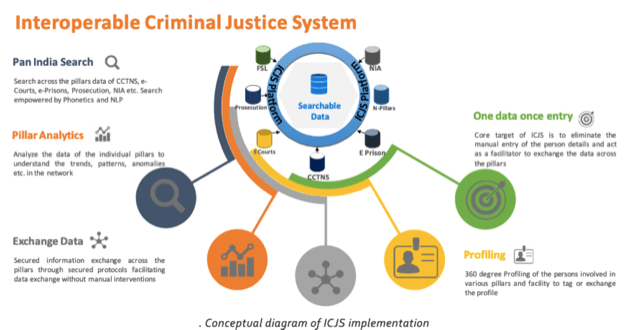UPSC Articles
GOVERNANCE/ SECURITY
- GS-2: Government policies and interventions for development in various sectors and issues arising out of their design and implementation.
- GS-3: Security & challenges
Inter-operable Criminal Justice System (ICJS)
Context: At the NCRB Foundation Day, the Union Home Minister remarked that the second phase of the Inter-operable Criminal Justice System (ICJS) project is set to be completed by 2026.
Do You Know?
- The Indore Police Commissioner recently unveiled a ‘fingerprint-based criminal record data fetching system’. The small thumb impression machine can be added to a phone to capture fingerprints at checking points, public spaces, etc.
- If the fingerprint recorded matches with the police database, all information about a person’s criminal record will be pulled up. The system is being lauded as it circumvents the long waiting period in fingerprint analysis as part of investigations.
What is ICJS?
- Inter-Operable Criminal Justice System (ICJS) is a national platform for enabling integration of the main IT system used for delivery of Criminal Justice in the country by five pillars namely:-
- Police (Crime and Criminal Tracking and Network Systems),
- e-Forensics for Forensic Labs,
- e-Courts for Courts,
- e-Prosecution for Public Prosecutors
- e-Prisons for Prisons.
- Invested under the CCTNS (Crime and Criminal Tracking Network and Systems) project of the MHA (Ministry of Home Affairs), the ICJS enables a nation wide search on police, prisons & courts databases across all States/ UTs in the country.
- It also provides for data Analytics for Forecasting/ Predictive Trends in Crimes reported region-wise, category-wise, and basis other parameters for effective management & control of crimes in future.
- The ICJS system would be made available through a dedicated and secure cloud-based infrastructure with high speed connectivity.
- National Crime Records Bureau (NCRB) will be responsible for the implementation of the project in association with National Informatics Center (NIC).
- The project will be implemented in collaboration with the States and Union Territories.
- In Phase-I (2018-2022) of the ICJS project, individual IT systems have been implemented and stabilized; also search of records have been enabled on these systems.
- Under Phase-II (2022-26), the system is being built on the principle of ‘one data one entry’ whereby data is entered only once in one pillar and the same is then available in all other pillars without the need to re-enter the data in each pillar.

Merits of ICJS
- It reduces errors and time taken in sharing of necessary information between different pillars of Criminal Justice system, thereby enabling speedier delivery of justice to the common man
- It also helps in improving investigation quality by leveraging the analytics inbuilt in the platform.
- The ICJS platform is an effective tool for the case and court management, as all the relevant information of a case will be available in real-time for use by the courts.
- Compliance of judicial orders and summons can also be achieved expeditiously, ensuring effective time management.
- Predictive Policing: Some other critical benefits arising out of the ICJS ecosystem is usable analytics products like the National Database on Sexual Offenders (NDSO) to identify & track repeat and habitual sexual offenders.
- The NDSO has become an integral part of pre-employment character & antecedent verifications, thereby reducing the opportunity for sexual crimes in several sensitive jobs.
- The ICJS is going to be a milestone to enhance the productivity of the criminal justice system both qualitatively and quantitatively.
What are the challenges in deploying technology in policing?
- Privacy– The Supreme Court in K.S Puttaswamy declared a fundamental right to informational privacy as paramount and noted that any measure that sought to collect information or surveil must be legal, necessary, and proportionate.
- Mass surveillance– Integrating fingerprint-based criminal record data fetching system to the list of predictive policing practices will give birth to mass surveillance.
- Disproportionate impact on poor & vulnerable– Mere suspicion or FIRs filed against an individual are sufficient to trigger the discretionary powers of the police that is misused against oppressed communities. Those subject to policing rarely include dominant caste persons with resources, who may have even been convicted of a crime.
Also Read











